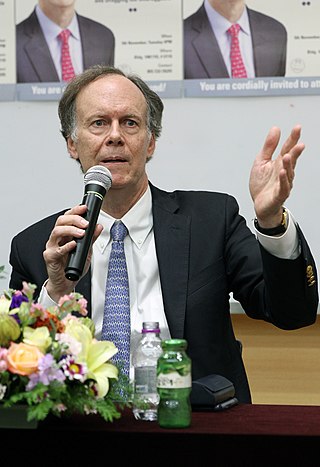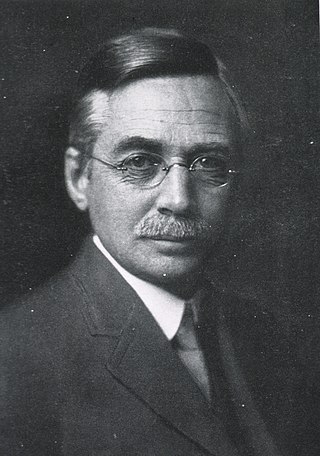Related Research Articles

Baruj Benacerraf was a Venezuelan-American immunologist, who shared the 1980 Nobel Prize in Physiology or Medicine for the "discovery of the major histocompatibility complex genes which encode cell surface protein molecules important for the immune system's distinction between self and non-self." His colleagues and shared recipients were Jean Dausset and George Davis Snell.

Albert Hewett Coons was an American physician, pathologist, and immunologist. He was the first person to conceptualize and develop immunofluorescent techniques for labeling antibodies in the early 1940s.

Ludwig Cancer Research is an international community of scientists focused on cancer research, with the goal of preventing and controlling cancer. It encompasses the Ludwig Institute for Cancer Research, an international non-profit organization founded in 1971 by philanthropist Daniel K. Ludwig. The Institute is headquartered in New York City, with a European office located in Zurich. In addition, six Ludwig Centers were established at leading US cancer research institutions. Together, the Institute and Centers are known as Ludwig Cancer Research.
Charles Alderson Janeway was an American pediatrician, medical professor, and clinical researcher.
The Duke University School of Medicine, commonly known as Duke Med, is the medical school of Duke University. It is located in the Collegiate Gothic-style West Campus of Duke University in Durham, North Carolina. The School of Medicine, along with the Duke University School of Nursing, Duke University Hospital, Duke Regional Hospital, Duke Children's Hospital, Duke Raleigh Hospital, and other affiliated hospitals, clinics, and laboratories, make up the Duke University Health System. Established in 1925 by James B. Duke, the School of Medicine has earned its reputation as an integral part of one of the world's foremost patient care and biomedical research institutions.

Francis Peyton Rous was an American pathologist at the Rockefeller University known for his works in oncoviruses, blood transfusion and physiology of digestion. A medical graduate from the Johns Hopkins University, he was discouraged to become a practicing physician due to severe tuberculosis. After three years of working as an instructor of pathology at the University of Michigan, he became dedicated researcher at the Rockefeller Institute for Medical Research for the rest of his career.

Steven A. Rosenberg is an American cancer researcher and surgeon, chief of Surgery at the National Cancer Institute in Bethesda, Maryland and a Professor of Surgery at the Uniformed Services University of Health Sciences and the George Washington University School of Medicine and Health Sciences. He pioneered the development of immunotherapy that has resulted in the first effective immunotherapies and the development of gene therapy. He is the first researcher to successfully insert foreign genes into humans.
Charles Alderson Janeway, Jr. (1943–2003) was a noted immunologist who helped create the modern field of innate immunity. A member of the National Academy of Sciences, he held a faculty position at Yale University's Medical School and was an Howard Hughes Medical Institute Investigator.

Jane Cooke Wright was a pioneering cancer researcher and surgeon noted for her contributions to chemotherapy. In particular, Wright is credited with developing the technique of using human tissue culture rather than laboratory mice to test the effects of potential drugs on cancer cells. She also pioneered the use of the drug methotrexate to treat breast cancer and skin cancer.

Lloyd John Old was one of the founders and standard-bearers of the field of cancer immunology. When Old began his career in 1958, tumor immunology was in its infancy. Today, cancer immunotherapies are emerging as a significant advance in cancer therapy.
Nicholas P. Restifo is an American immunologist, physician and educator in cancer immunotherapy. Until July 2019, he was a tenured senior investigator in the intramural National Cancer Institute of the National Institutes of Health at Bethesda, Maryland. Nicholas was an executive vice president of research at Lyell based in San Francisco.
Peter Cresswell FRS is a British immunologist, and Eugene Higgins Professor of Immunobiology and Professor of Cell Biology and of Dermatology, at Yale School of Medicine. His lab primary focuses on the molecular mechanisms of antigen processing particularly the functions of the major histocompatibility complex (MHC) molecules and CD1 molecules. He is most notable for discovering and identifying the MHC class II molecules and viperin.

James Patrick Allison is an American immunologist and Nobel laureate who holds the position of professor and chair of immunology and executive director of immunotherapy platform at the MD Anderson Cancer Center at the University of Texas.
Werner Henle and Gertrude Henle were a husband and wife team of German-American virologists. The National Library of Medicine called them "a prodigious force in virology, immunology and viral oncology during the second half of the 20th century".

William G. Kaelin Jr. is an American Nobel laureate physician-scientist. He is a professor of medicine at Harvard University and the Dana–Farber Cancer Institute. His laboratory studies tumor suppressor proteins. In 2016, Kaelin received the Albert Lasker Award for Basic Medical Research and the AACR Princess Takamatsu Award. He also won the Nobel Prize in Physiology or Medicine in 2019 along with Peter J. Ratcliffe and Gregg L. Semenza.
Warfield Theobald Longcope was an American pathologist. He served as physician-in-chief of the Johns Hopkins Hospital and president of the American Association of Immunologists, Association of American Physicians, and American Society for Clinical Investigation.
James Wesley Jobling (1876–1961) was an American physician who was a longtime professor at Columbia University College of Physicians and Surgeons and second president of the American Association of Immunologists.

Bjarne Bogen is a Norwegian immunologist, inventor and physician. He is widely known for his research on DNA vaccines, autoimmune disorders and cancer immunology.

Ludvig Hektoen was an American pathologist known for his work in the fields of pathology, microbiology and immunology. Hektoen was appointed to the National Academy of Sciences in 1918, and served as president of many professional societies, including the American Association of Immunologists in 1927 and the American Society for Microbiology in 1929. He was the founding editor of the Archives of Pathology and Laboratory Medicine in 1926 and edited several other medical journals. He was knighted to the Order of St. Olav in 1929, and in 1933, he became professor emeritus of pathology at the University of Chicago. The Hektoen Institute for Medical Research—formerly the John McCormick Institute of Infectious Diseases—now bears his name.
John Graydon Kidd was an American physician, pathologist, and virologist.
References
- ↑ "Jack G. Makari". The New York Times . May 12, 2013.
- 1 2 3 4 "Jack G. Makari". Hartford Courant. May 6, 2013.
- 1 2 3 4 5 6 "Makari Interdermal Cancer Test". 19. CA: A Journal for Cancer Clinicians. doi:10.3322/canjclin.19.5.312.
{{cite journal}}: Cite journal requires|journal=(help) - ↑ Proceedings of the Fourth International Conference on Tropical Medicine and Malaria. Department of State. 1948. p. 818.
- ↑ Andrews, Edmund L. (June 25, 1988). "PATENTS; Skin Test Developed For Cancer Detection". The New York Times .
- ↑ Louis Galambos; Jane Eliot Sewell (1997). Networks of Innovation: Vaccine Development at Merck, Sharp and Dohme, and Mulford, 1895-1995. Cambridge University Press. p. 128. ISBN 978-0-521-62620-0.
- ↑ Makari, Jack G. (1965). "Activity of a Tumour Polysaccharide Substance on Mice Transplanted with Sarcoma 180". Nature. 205 (4977): 1178. Bibcode:1965Natur.205.1178M. doi:10.1038/2051178a0. S2CID 41684942.
- ↑ Jack G. Makari; Marjorie G. Huck (1955). "Use Of Schultz-Dale Test For Detection Of Specific Antigen In Sera Of Patients With Carcinoma". British Medical Journal.
- ↑ "DISCUSSION: Jack G. Makari". Annals of the New York Academy of Sciences. 1963. doi:10.1111/j.1749-6632.1963.tb53754.x. S2CID 222085597.
{{cite journal}}: Cite journal requires|journal=(help)